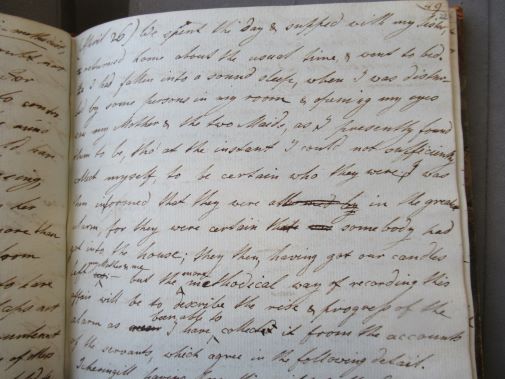A diary recording the experiences of a York woman during the Napoleonic Wars has been published, nearly 30 years after it was 'accidentally' discovered.
 The diary recorded between 1803 and 1805, including details of Jane Ewbank's life in York
The diary recorded between 1803 and 1805, including details of Jane Ewbank's life in York
The diary of Jane Ewbank charts her interests in science, theatre, concerts, and the natural world during the period, and was discovered accidentally in the National Library of Scotland by Dr Jane Rendall, a former member of the Department of History at the University of York, now associated with the Centre for Eighteenth Century Studies.
Life in York
Jane, born in 1778, was the daughter of George Ewbank, a well-known druggist and banker in York, who lived and had his shop on Castlegate in the City Centre. She died at the young age of 46 in 1824.
The diary, published in digital form, consists of around 34,000 words recorded between 1803 and 1805, including details of her life in York and her travels in the Lake District and North Yorkshire. It stands as a unique illustration of what life was like in York for a woman during the 1800s.
The diary, which will now be the focus of an academic conference, demonstrates that Jane had an active social life, frequently attending plays at York Theatre Royal, concerts in the Assembly Rooms and many lectures on science.
Women writers
Dr Rendall said: "I found the diary of Jane Ewbank in the 1990s totally by chance when I was working on women writers in eighteenth-century Scotland. When I read it, I was totally fascinated, because I realised how much light it threw on the life of a York woman from this time in history.
"Over the years, I have passed it to several students writing theses on York women's history. I had always hoped to publish the diary, so I am thrilled that it is now widely available for others to read and enjoy and for the diary to be the focus of a conference."
Conference
The conference - also open to members of the public - will bring together scholars in women's history, the history of science, literature, theatrical performance, music and historical archaeology from across the UK and the US, to contextualise and analyse the diary.
Co-organised by Dr Rendall, on behalf of the Centre for Eighteenth Century Studies, which is based at King's Manor in the centre of York, speakers include a historical archaeologist of York, historians of science, literary specialists, and historians of eighteenth-century theatre and music.
The conference, 'Science, Gender and Sociability in a Northern City c. 1775-1820', supported by the University of York, will take place from 8-10th June, and is also supported by the Modern Humanities Research Association, the British Society for the History of Science, the Yorkshire Philosophical Society and the York Georgian Society.






